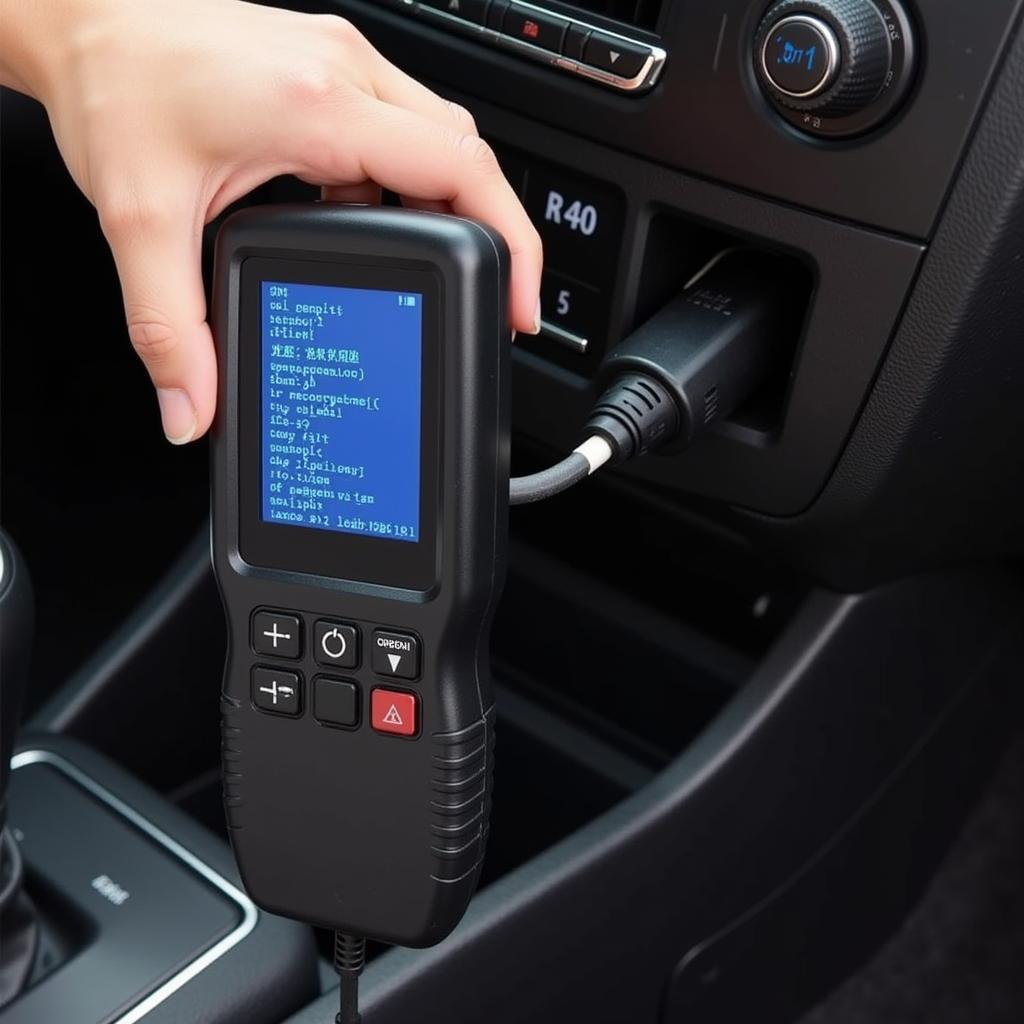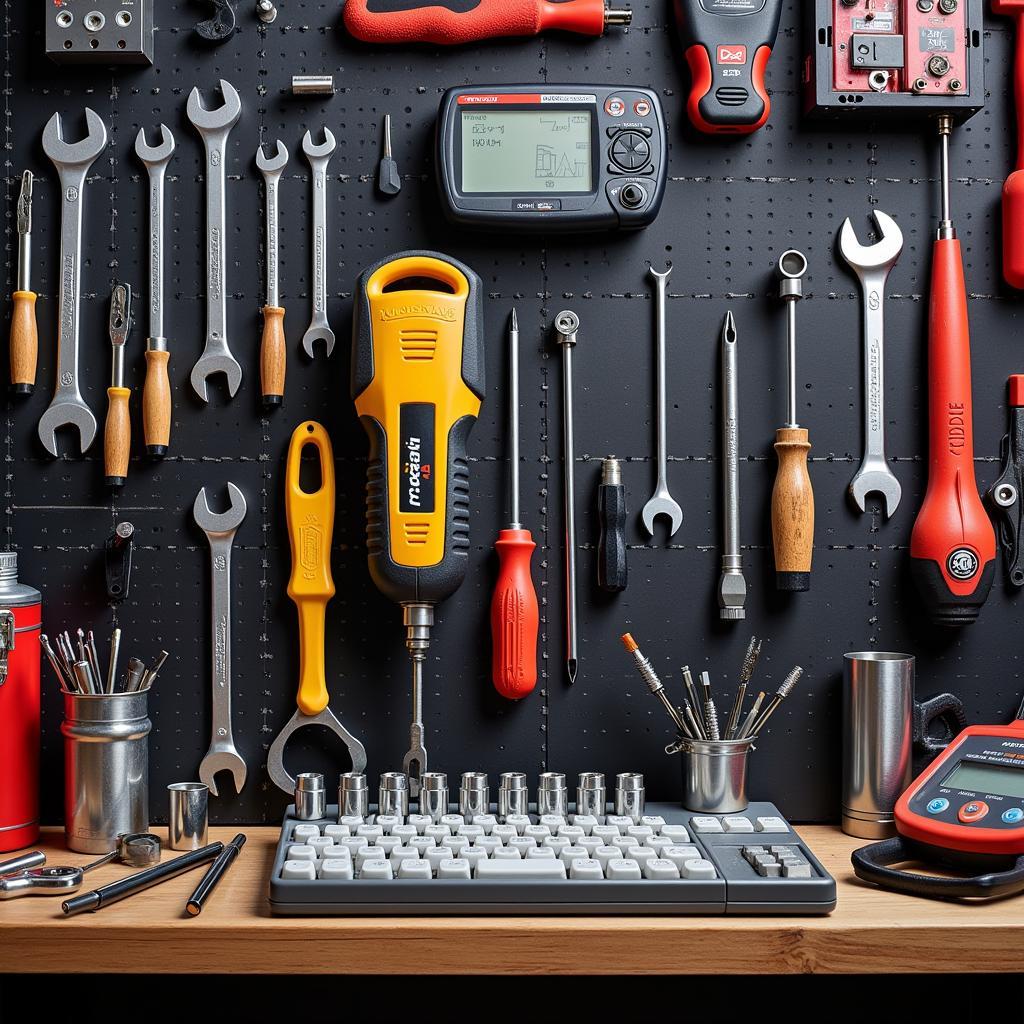Knowing the names of car garage tools is crucial for any DIY mechanic or professional technician. Whether you’re troubleshooting a check engine light or performing routine maintenance, having the right tools and knowing what they’re called can save you time, money, and frustration. This article will explore essential Car Garage Tools Names, their uses, and why they’re vital for any car enthusiast or professional.
Working on your car can be intimidating, especially if you’re unsure which tools you need. From simple hand tools to more complex diagnostic equipment, understanding car garage tools names empowers you to tackle automotive repairs and maintenance with confidence. This guide will help you navigate the world of car garage tools, providing clear explanations and valuable insights.
Common Hand Tools: The Foundation of Any Garage
Every car maintenance task starts with a set of basic hand tools. These are the workhorses of your garage and are essential for numerous repairs.
- Wrenches: Used for tightening and loosening nuts and bolts. Variations include combination wrenches, open-end wrenches, and adjustable wrenches.
- Screwdrivers: Essential for removing and installing screws. Different types include Phillips, flathead, and Torx.
- Pliers: Versatile tools for gripping, cutting, and bending. Common types include slip-joint pliers, needle-nose pliers, and locking pliers.
- Sockets and Ratchets: Used in conjunction to quickly tighten and loosen nuts and bolts, especially in tight spaces.
- Hammers: Used for driving nails, removing parts, and shaping metal.
After this foundational set of tools, you’ll likely need more specialized equipment as your automotive projects become more complex.
A high-quality diagnostic tool is crucial for identifying and addressing hidden issues. For Volvo owners, a diagnostic tool for Volvo cars can be invaluable for maintaining optimal performance.
Diagnostic Tools: Unlocking the Secrets of Your Car
Modern vehicles are complex machines controlled by sophisticated computer systems. Diagnostic tools are essential for understanding and resolving issues within these systems.
- OBD-II Scanner: A handheld device that plugs into your car’s OBD-II port to retrieve diagnostic trouble codes (DTCs). These codes pinpoint specific problems within the vehicle’s systems.
- Multimeter: Measures voltage, current, and resistance, helping diagnose electrical problems.
- Pressure Gauge: Measures the pressure of various fluids, including tire pressure, oil pressure, and fuel pressure.
- Vacuum Gauge: Used to test engine vacuum, which can indicate problems with intake manifolds, valves, and other engine components.
 OBD-II Scanner Connected to Car’s Diagnostic Port
OBD-II Scanner Connected to Car’s Diagnostic Port
Power Tools: Amplifying Your Efficiency
Power tools significantly speed up various car maintenance and repair tasks.
- Impact Wrench: Used to quickly remove and install lug nuts and other fasteners that require high torque.
- Drill: Used for drilling holes and driving screws. Cordless drills offer greater portability and convenience.
- Angle Grinder: Used for cutting, grinding, and polishing metal.
- Sander: Used for smoothing surfaces and removing rust or paint.
Understanding these tool names is the first step towards effective automotive maintenance. For car owners in the USA, a reliable car diagnostic scanner usa can be an essential part of your toolkit.
Car Garage Tools Names: Specialized Tools for Specific Tasks
Beyond the common tools, specialized tools are designed for particular tasks, offering precision and efficiency.
- Brake Bleeder Kit: Used to remove air from the brake lines, ensuring optimal braking performance.
- Fuel Line Disconnect Tool: Safely disconnects fuel lines without causing damage.
- Ball Joint Separator: Used to separate ball joints from control arms.
- Timing Light: Used to check and adjust ignition timing.
Why Knowing Car Garage Tools Names is Important
Knowing car garage tools names is crucial for several reasons:
- Effective Communication: You can clearly communicate your needs when purchasing or borrowing tools.
- Improved Safety: Using the correct tool for the job ensures safety and prevents damage to your vehicle.
- Efficient Repairs: Knowing which tool to use saves time and frustration during repairs.
- Enhanced Learning: Understanding tool names helps you follow repair manuals and online tutorials.
“Knowing the right names for your tools is half the battle,” says John Davis, a seasoned automotive technician with over 20 years of experience. “It allows you to quickly locate the tools you need and ensures you’re using the correct tool for the job, ultimately saving you time and preventing potential damage.”
 Various Car Garage Tools Organized on a Workbench
Various Car Garage Tools Organized on a Workbench
Conclusion: Empowering Yourself with Knowledge
Knowing car garage tools names is fundamental for anyone working on their vehicle. This knowledge empowers you to tackle automotive repairs with confidence and efficiency. Whether you’re a seasoned mechanic or a DIY enthusiast, understanding the names and functions of your tools is crucial for safe and successful car maintenance. Investing in the right tools and familiarizing yourself with their names will pay off in the long run, allowing you to maintain your vehicle effectively and save money on costly repairs.
FAQs
- What is an OBD-II scanner used for? An OBD-II scanner retrieves diagnostic trouble codes (DTCs) to help pinpoint problems within a vehicle’s systems.
- Why are different types of wrenches necessary? Different wrench types accommodate various nut and bolt sizes and shapes.
- What is the purpose of a timing light? A timing light checks and adjusts ignition timing.
- Why is a brake bleeder kit important? It removes air from brake lines for optimal braking performance.
- What does a multimeter measure? A multimeter measures voltage, current, and resistance.
- What’s the difference between a socket and a wrench? Sockets are used with ratchets for faster turning in tight spaces, while wrenches offer more leverage.
- Why are pliers important? Pliers are versatile for gripping, cutting, and bending various materials.
Need assistance with your car diagnostic needs? Contact us via WhatsApp: +1(641)206-8880, Email: [email protected] or visit us at 910 Cedar Lane, Chicago, IL 60605, USA. Our customer service team is available 24/7.

Leave a Reply